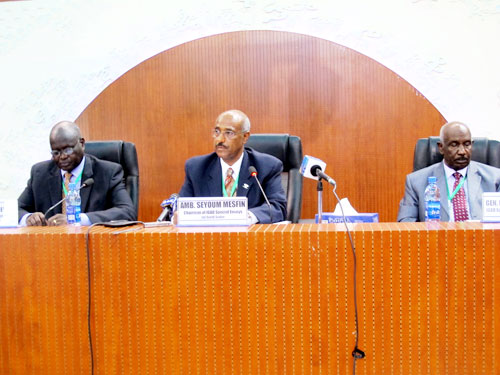29 September- In a bid to find a lasting solution to the political crisis in South Sudan, the Sixth Session of Phase II of the IGAD-led multi-stakeholder roundtable peace talks continue in Bahirdar, the capital of Amhara National Regional State of Ethiopia.
The Government of the Republic of South Sudan-GRSS, the Sudan People’s Liberation Movement/ Sudan People’s Liberation Army (In Opposition), and the SPLM Leaders (Former Detainees) are the main negotiators while Civil Society Organizations, the Women Block and the Faith-Based Organizations as well as eminent personalities are participating as observers. The issue of political parties’ representation in the talks has yet to be solved. The IGAD Mediation Team, IGAD and friends of South Sudan are working hard to unlock the impasses regarding representations of political parties.
The negotiations began in earnest on the basis of the ‘Text Arising from the 25 August Protocol and Stakeholders’ Positions ( Draft I)’ which the mediation table it to the participants on 22 September. After a series of consultations with them, they accepted it as the basis for the negotiations to find sustainable peace and stability in the Republic of South Sudan.
Following consultations with the IGAD Special Envoys, namely Amb. Seyoum Mesfin, Gen. Lazaro Sumbeiywo and Gen. Mohamed Mustafa El Dabi, the parties established two Committees, the Leadership Committee (with a mandate to negotiate and resolve outstanding issues between the parties) and a Technical Committee (whose mandate is to harmonize positions of the Parties and produce a harmonized document of the process). These are all done in face-to-face discussions on the ‘Text Arising from the 25 August Protocol and Stakeholders’ Positions (Draft I)’. Those issues include, Transitional Governance Arrangements; Transitional Security Arrangements; Resource, Economic and Financial Arrangements; Transitional Justice, Reconciliation and Healing; Humanitarian Concerns; and Parameters for a Permanent Constitution.
Ever since their creation, both Committees have assumed their responsibilities with an unprecedented display of candor and commitment, in a generally friendly negotiating environment. Whilst there are challenges similar to those experienced by every peace negotiation, the overall disposition is a positive one and within that context and broadly speaking, a degree of consensus is beginning to emerge among the parties on some areas including, System of Governance, structure and functions of the Transitional Government of National Unity and its seat, (with same degree of flexibility to further debate the issues), the size and composition of the Council of Ministers, the time needed for the transition period etc.
While the Parties continue to talk, IGAD Special Envoys and the Secretariat are on hand to support and guide the process. In the past couple of days, such support has come in a form of advise, in meetings with the Parties, to stay the course and to confront the issues head-on innovatively, if the 45-day deadline set by the IGAD leaders is to be met and the conflict in South Sudan resolved promptly.
Furthermore, the Envoys encouraged the Parties to maintain the positive attitude and to tackle those issues most likely to result into a Final Peace Agreement. In an effort to assist the Parties to have better understanding about transitional governance arrangement for resolving a state violent crisis both in concept and drawing experiences from other similar situations, a senior expert from Kenya who will help the parties narrow their differences, by sharing global and continental comparative experiences has been invited. The process continues and the IGAD Mediation further urged the parties to amply demonstrate their rejection to military solution and commit themselves to a political solution through the spirit of compromise, give and take, and to work for win-win solutions for sustainable peace and stability of South Sudan.
